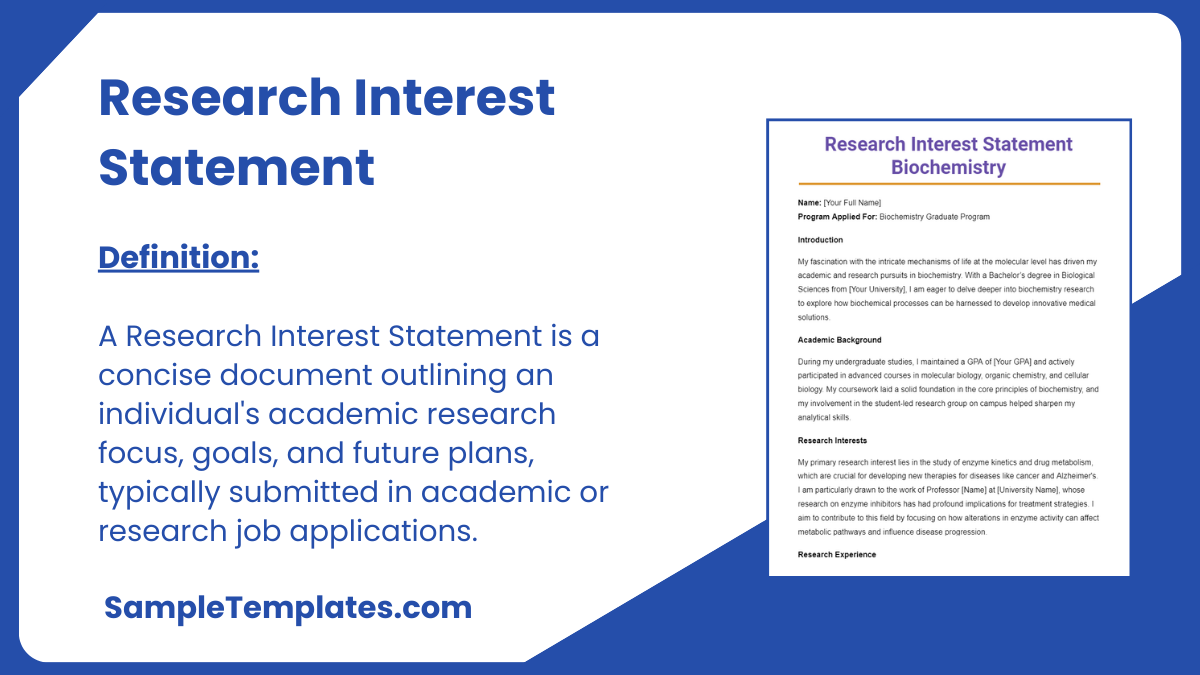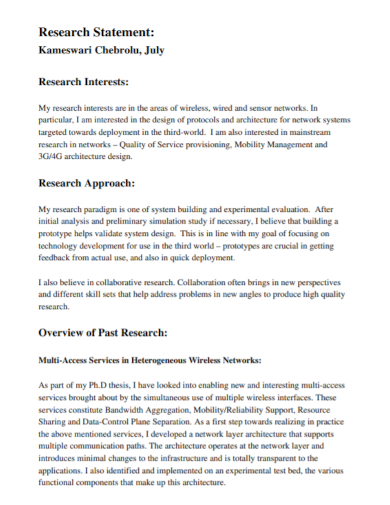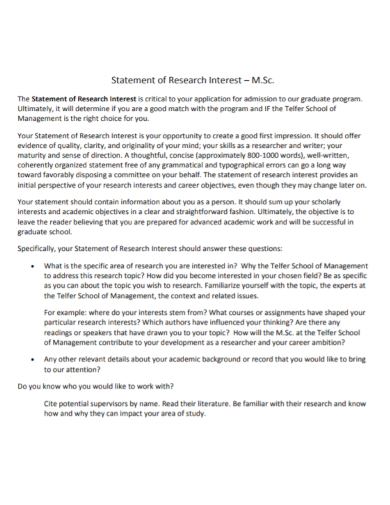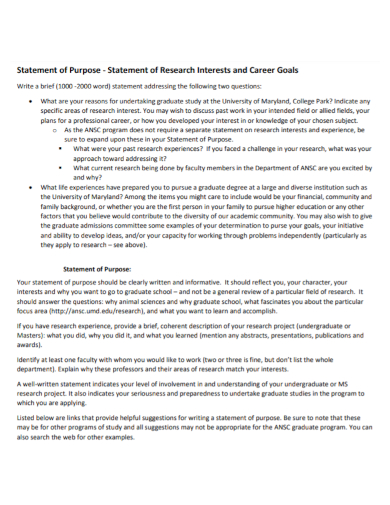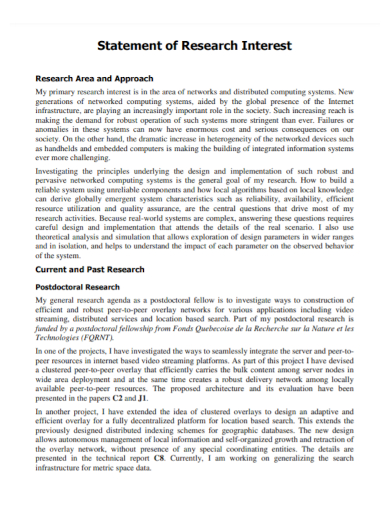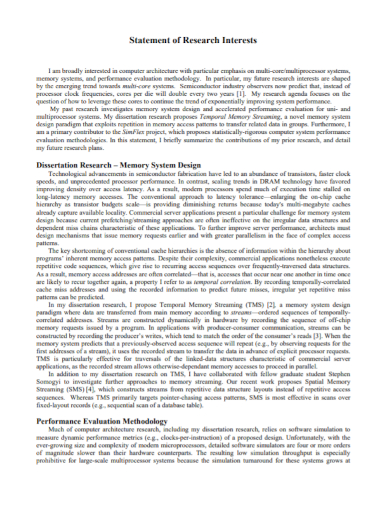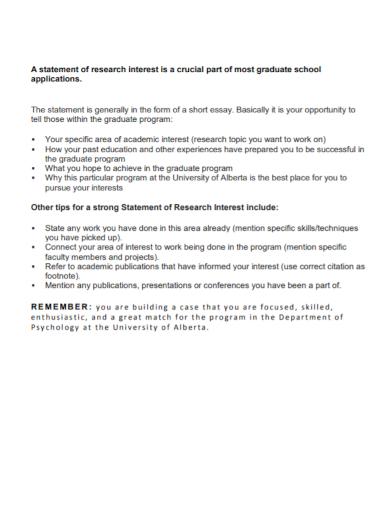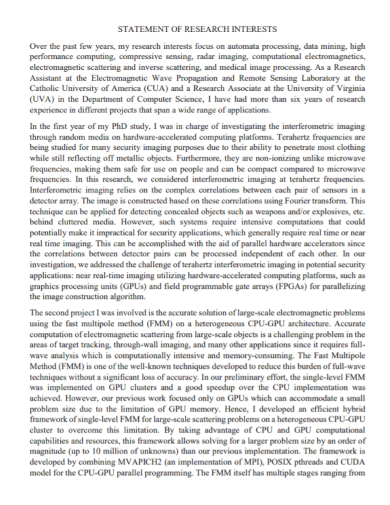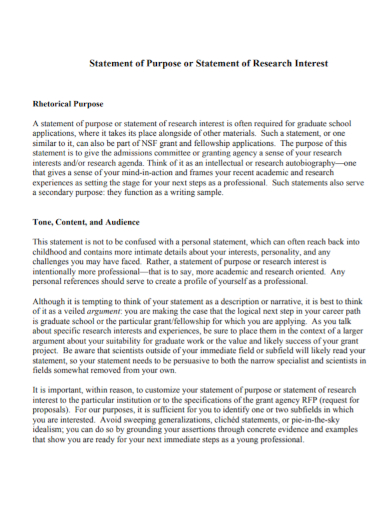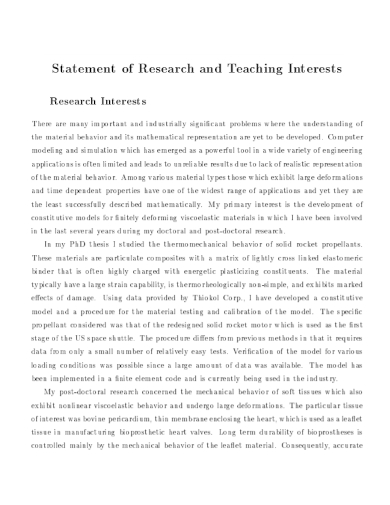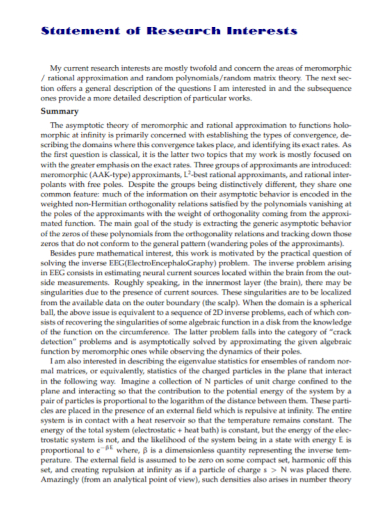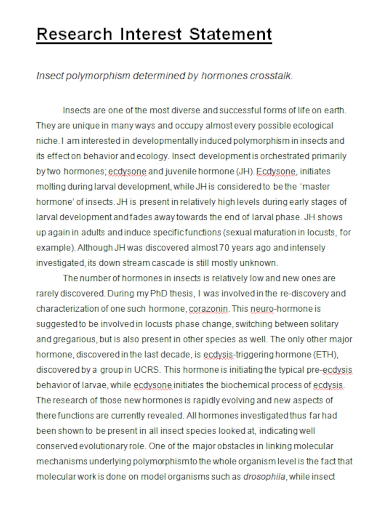Writing a research paper— whether for academic, work, or personal interest— is a challenge. From gathering your related literature, to figuring out your methodology, and to finding reliable respondents/participants for your data; everything has to be meticulously planned out and written. But what might be the most challenging of all is conceptualizing your research problem.
The legitimacy of your research and yourself as the researcher can be found in the overview of your Statement of the Research Interest. With this in mind, writing your research interest can be daunting since you’re still barely solidifying the outline of your paper– but don’t fret! In this article, we give you free, editable, and printable Research Interest Statement samples that you can use to guide you in your research paper. Keep on reading to find out more!
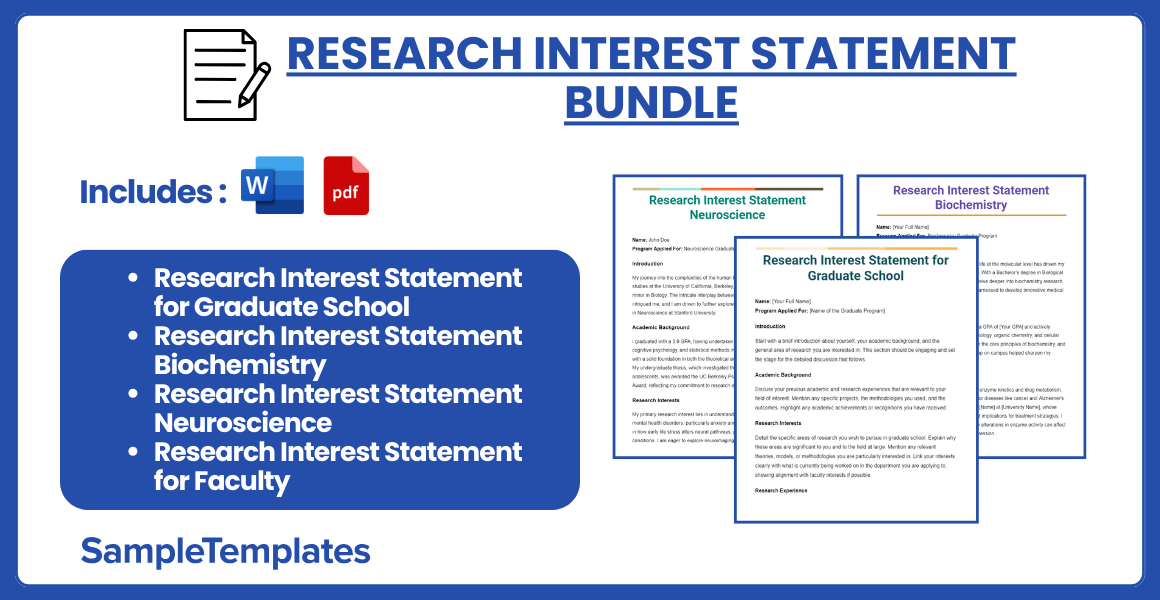
Download Research Interest Statement Bundle
Research Interest Statement for Graduate School
Name: [Your Full Name]
Program Applied For: [Name of the Graduate Program]
Introduction
Start with a brief introduction about yourself, your academic background, and the general area of research you are interested in. This section should be engaging and set the stage for the detailed discussion that follows.
Academic Background
Discuss your previous academic and research experiences that are relevant to your field of interest. Mention any specific projects, the methodologies you used, and the outcomes. Highlight any academic achievements or recognitions you have received.
Research Interests
Detail the specific areas of research you wish to pursue in graduate school. Explain why these areas are significant to you and to the field at large. Mention any relevant theories, models, or methodologies you are particularly interested in. Link your interests clearly with what is currently being worked on in the department you are applying to, showing alignment with faculty interests if possible.
Research Experience
Elaborate on your hands-on research experiences. Describe the projects you worked on, your role in these projects, the skills you acquired, and the results you helped achieve. Be specific about any innovative or challenging aspects of your work.
Future Goals
Articulate your short-term and long-term goals. Explain how the graduate program and its faculty can help you achieve these goals. Discuss the potential impact of your research on the field and possibly on broader issues outside the academic community.
Conclusion
Conclude with a strong statement that summarizes why you are a suitable candidate for the program and how the program fits into your career and research ambitions. Reiterate your enthusiasm for the opportunity to contribute to and grow within the graduate program.
Contact Information
Provide your contact information for further communication.
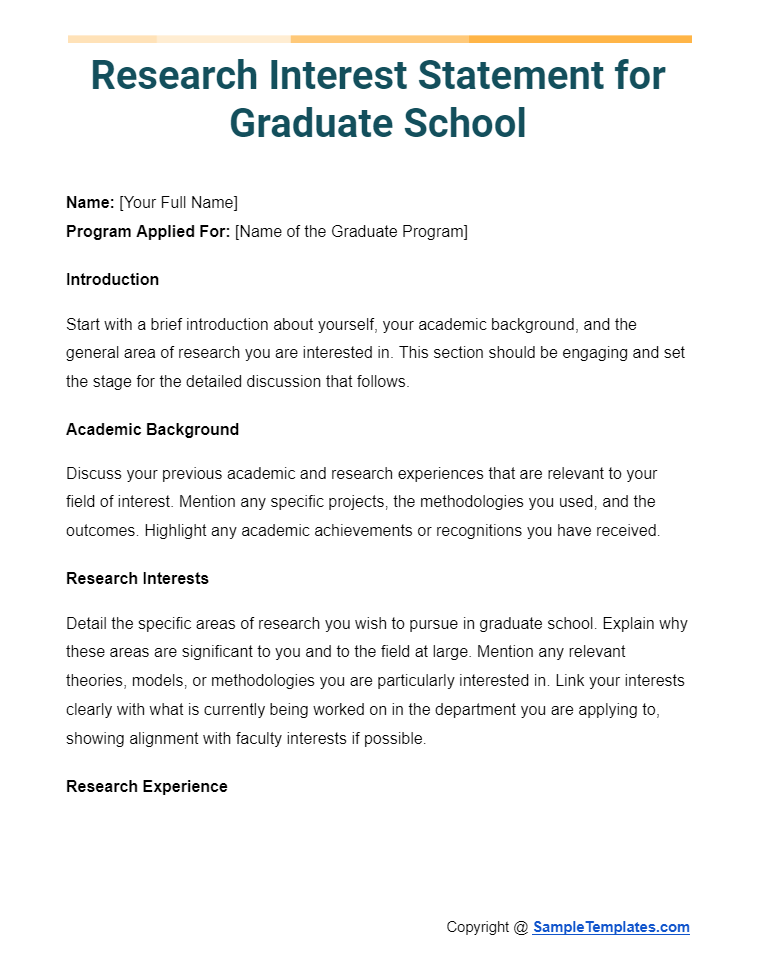
Research Interest Statement Biochemistry
Name: [Your Full Name]
Program Applied For: Biochemistry Graduate Program
Introduction
My fascination with the intricate mechanisms of life at the molecular level has driven my academic and research pursuits in biochemistry. With a Bachelor’s degree in Biological Sciences from [Your University], I am eager to delve deeper into biochemistry research to explore how biochemical processes can be harnessed to develop innovative medical solutions.
Academic Background
During my undergraduate studies, I maintained a GPA of [Your GPA] and actively participated in advanced courses in molecular biology, organic chemistry, and cellular biology. My coursework laid a solid foundation in the core principles of biochemistry, and my involvement in the student-led research group on campus helped sharpen my analytical skills.
Research Interests
My primary research interest lies in the study of enzyme kinetics and drug metabolism, which are crucial for developing new therapies for diseases like cancer and Alzheimer’s. I am particularly drawn to the work of Professor [Name] at [University Name], whose research on enzyme inhibitors has had profound implications for treatment strategies. I aim to contribute to this field by focusing on how alterations in enzyme activity can affect metabolic pathways and influence disease progression.
Research Experience
I have gained substantial research experience working on my capstone project under the mentorship of Professor [Mentor’s Name]. Our project aimed to identify novel inhibitors that could modulate the activity of [Specific Enzyme], a key player in [Disease or Process]. Through this project, I developed skills in chromatography, spectrophotometry, and molecular modeling, and our findings were published in [Journal Name], highlighting potential therapeutic targets for [Disease or Condition].
Future Goals
In the short term, I aim to expand my research in enzyme kinetics within the Biochemistry program at [University Name], utilizing its cutting-edge facilities and collaborating with leading scientists in the field. My long-term goal is to lead an academic research team that develops biochemically-based therapeutic strategies, bridging the gap between laboratory research and clinical application.
Conclusion
I am confident that my background in biological sciences and my specific interest in biochemistry make me a well-suited candidate for the Biochemistry Graduate Program at [University Name]. The opportunity to work alongside esteemed researchers and contribute to innovative biochemistry research excites me, and I am enthusiastic about the prospect of advancing my career within your program.
Contact Information
[Your Phone Number]
[Your Email Address]
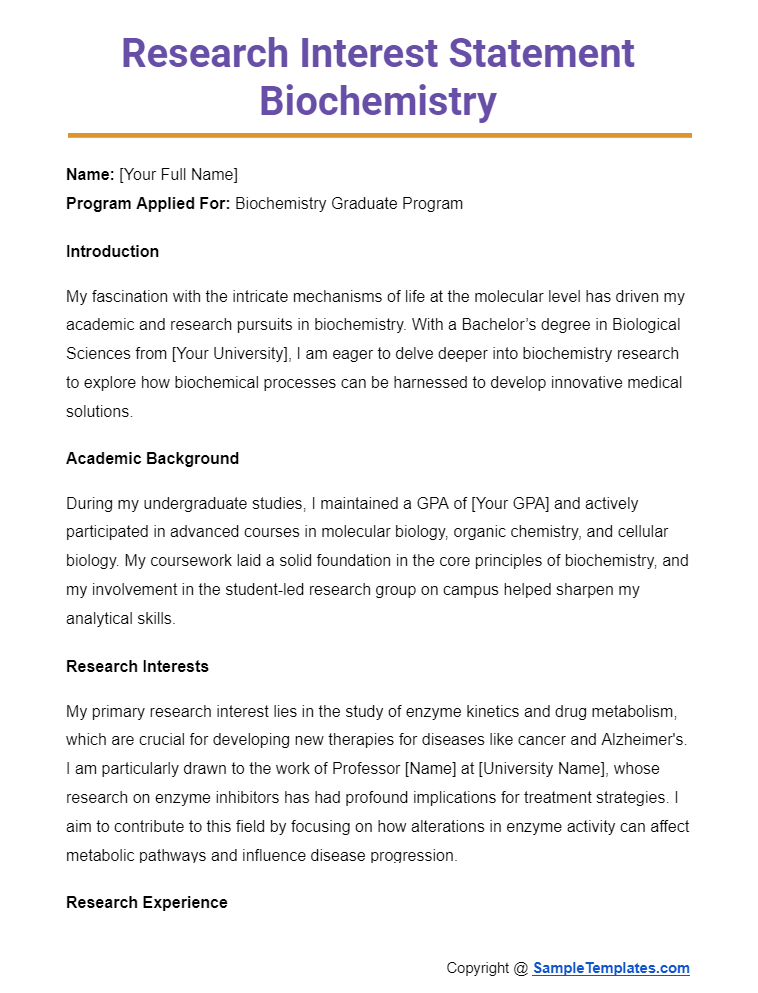
Research Interest Statement Neuroscience
Name: John Doe
Program Applied For: Neuroscience Graduate Program at Stanford University
Introduction
My journey into the complexities of the human brain began during my undergraduate studies at the University of California, Berkeley, where I majored in Psychology with a minor in Biology. The intricate interplay between neural circuits and behavior has always intrigued me, and I am driven to further explore this field by pursuing a graduate degree in Neuroscience at Stanford University.
Academic Background
I graduated with a 3.9 GPA, having undertaken rigorous coursework in neurobiology, cognitive psychology, and statistical methods in research. These courses equipped me with a solid foundation in both the theoretical and practical aspects of brain sciences. My undergraduate thesis, which investigated the neural correlates of anxiety in adolescents, was awarded the UC Berkeley Psychology Department’s Best Thesis Award, reflecting my commitment to research excellence.
Research Interests
My primary research interest lies in understanding the neural mechanisms underlying mental health disorders, particularly anxiety and depression. I am especially interested in how early life stress alters neural pathways, potentially leading to psychiatric conditions. I am eager to explore neuroimaging and neurophysiological techniques to study these alterations at Stanford, known for its pioneering research in neurodevelopmental studies.
Research Experience
Under the guidance of Professor Jane Smith during my undergraduate research internship, I participated in a project that utilized fMRI to study brain patterns associated with emotional regulation in young adults. This hands-on experience not only honed my technical skills in using advanced imaging techniques but also deepened my understanding of the practical challenges in neuroscience research. Our team’s findings were presented at the American Psychological Association annual conference, highlighting potential targets for therapeutic intervention.
Future Goals
My immediate objective is to join the Neuroscience Graduate Program at Stanford University to further my research under the mentorship of Professor Michael Thompson, whose work on the impact of stress on the hippocampus has been seminal. My long-term career goal is to lead a research lab that contributes to developing more effective interventions for mental health disorders, bridging the gap between neuroscience research and clinical practice.
Conclusion
The Neuroscience Graduate Program at Stanford University represents the perfect environment for me to grow as a scientist. I am excited about the opportunity to contribute to and learn from the cutting-edge research being conducted at your institution. I am confident that my background and skills align well with the goals of your program, making me a strong candidate for this graduate study.
Contact Information
John Doe
johndoe@email.com
(123) 456-7890
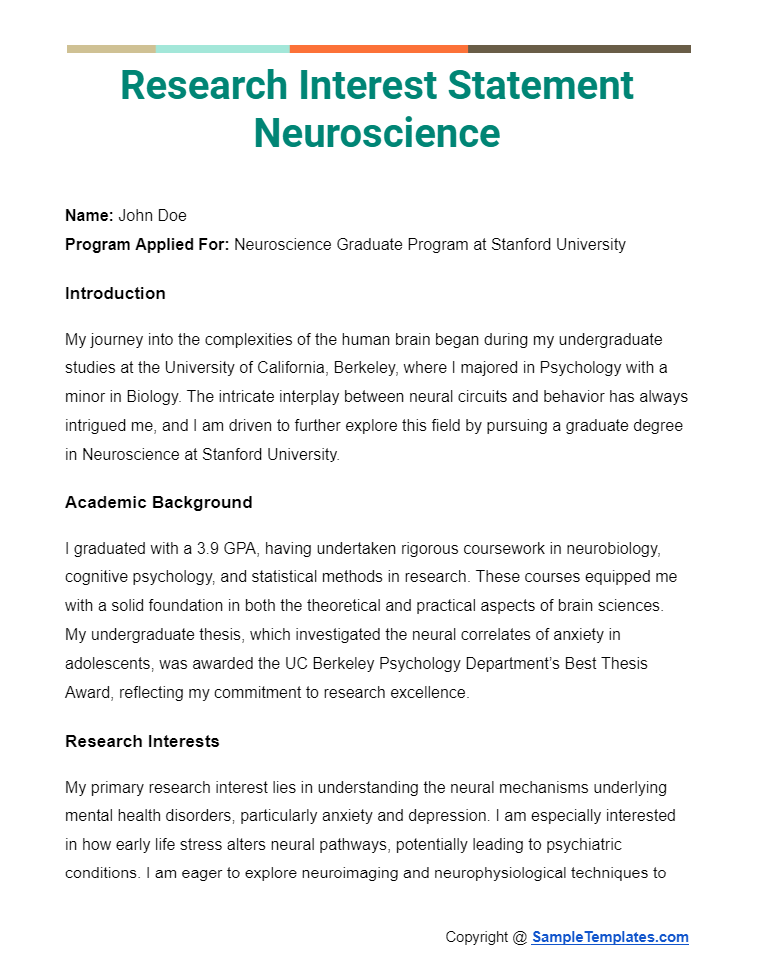
Research Interest Statement for Faculty
Name: [Your Full Name]
Position Applied For: Assistant Professor of [Specific Field/Department]
Introduction
As an accomplished researcher with a Ph.D. in [Your Field] from [Your University], I am eager to bring my expertise in [specific area, e.g., molecular biology, computational physics] to the [Department Name] at [University Name]. My career has been dedicated to advancing our understanding of [general area of research], with a particular focus on [more specific area or issue].
Research Background
My research journey began with my doctoral dissertation on [Title of Dissertation], which explored [brief description of the dissertation topic]. This work was recognized with [mention any awards or recognitions if applicable], underscoring its impact in the field of [Your Field]. Following my Ph.D., I continued to develop my research agenda at [Your Postdoctoral Institution or Current Job], where I [describe what you have been working on recently].
Current Research Interests
Currently, my research centers around [describe your current research focus], with an emphasis on [describe the methodologies, theories, or technologies you use]. My recent projects have included [briefly describe one or two recent projects], which have [mention any significant results, publications, or collaborations]. These efforts not only contribute to the scientific community but also have potential applications in [mention any potential real-world applications of your research].
Future Research Plans
Looking ahead, I plan to expand my research into [describe any planned research projects or directions]. I am particularly excited about the opportunity to collaborate with [mention any specific faculty at the university or types of researchers you hope to collaborate with], to explore [mention any collaborative research ideas]. Additionally, I aim to secure funding from [mention any agencies or organizations you plan to target for grants], to support this work and provide research opportunities for graduate students.
Contribution to the University
I am committed to contributing to the academic and collegial environment at [University Name] through both my research and teaching. I look forward to contributing to [mention any specific courses you could teach or curricular developments], and mentoring the next generation of researchers. My background in [mention any specific skills or experiences] positions me well to contribute to [mention any departmental initiatives, centers, or interdisciplinary projects].
Conclusion
I am enthusiastic about the possibility of joining [University Name] and believe that my research interests align closely with the goals of the [Department Name]. I am eager to bring my passion for [Your Field], along with my proven track record of research and teaching excellence, to your esteemed department.
Contact Information
[Your Phone Number]
[Your Email Address]
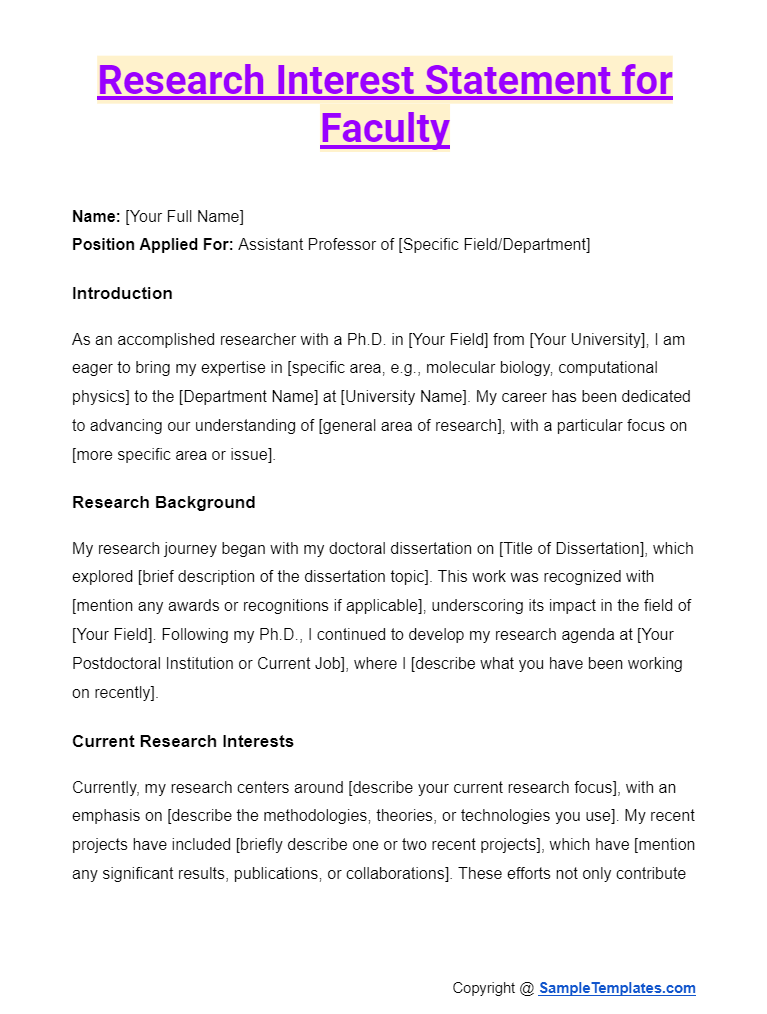
Browse More Templates On Research Interest Statement
1. Research Interest Example
2. Research Interest Statement Sample
How Do You Write a Statement of Interest?
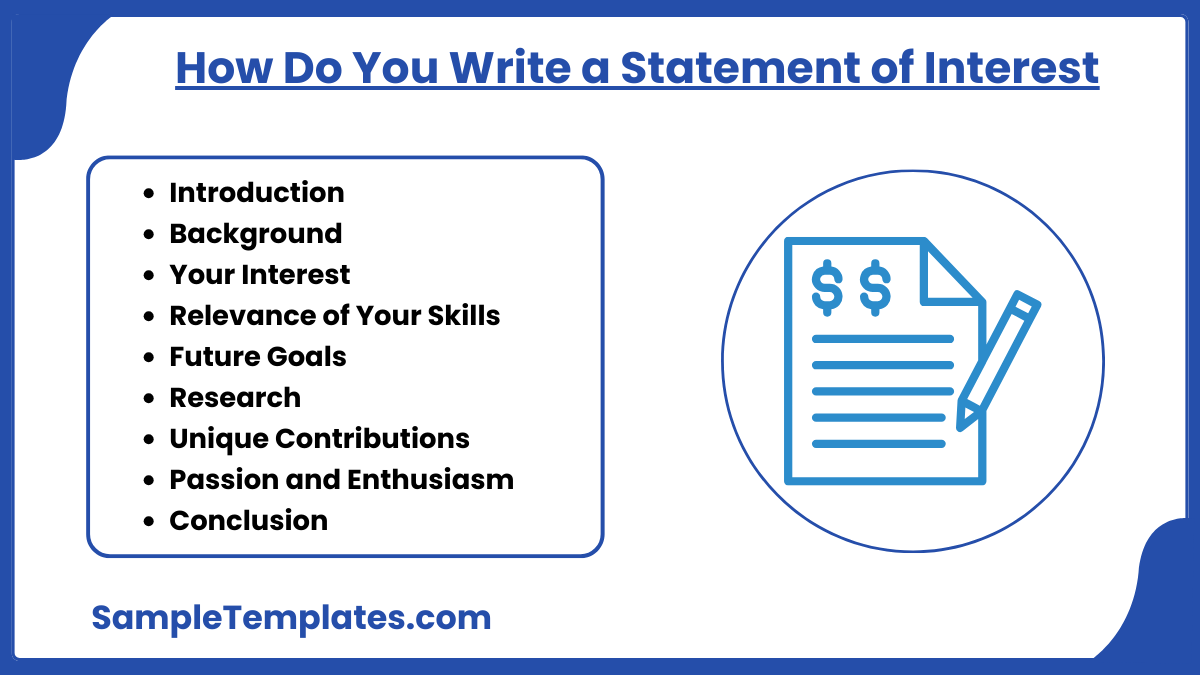
- Introduction: Start with a strong opening that grabs the reader’s attention. This could be a personal anecdote, a relevant quote, or a brief overview of your interest in the field.
- Background: Provide a brief overview of your educational and professional background. Highlight experiences, skills, and achievements that are relevant to the position or program you are applying for.
- Your Interest: Clearly state why you are interested in the program or position. Discuss what specifically attracts you and how it aligns with your academic or career goals. Be specific and genuine. You can also see more on Brief Research Statement.
- Relevance of Your Skills: Connect your skills and experiences to the requirements of the program or job. Provide specific examples that demonstrate your abilities and accomplishments. Show how your unique qualities make you a strong candidate.
- Future Goals: Discuss your long-term goals and how the opportunity you’re applying for fits into those plans. This helps the reader understand the broader context of your application.
- Research: Demonstrate that you’ve researched the program or job. Mention specific faculty members, courses, projects, or aspects of the organization that align with your interests. This shows your genuine interest and preparedness.
- Unique Contributions: Highlight what you can contribute to the program or organization. Whether it’s specific skills, perspectives, or experiences, emphasize how you can enhance the community you’re joining.
- Passion and Enthusiasm: Convey your passion for the field or industry. Use enthusiastic language, but avoid excessive or exaggerated statements. Be sincere and authentic.
- Conclusion: Summarize your main points and reiterate your enthusiasm for the opportunity. End with a strong and memorable closing statement.
3. Purpose of the Study Example
4. Research Interest Sample
5. Statement of Research Interest
6. Example of Research Interest
7. Describe Your Research Interests Examples
What is a Statement of Interest for Students?
A Statement of Interest for students is a written document that outlines a student’s motivations, interests, and goals related to a particular academic program, scholarship, internship, or other educational opportunities. It is often required as part of the application process for various educational programs or opportunities.
In a Statement of Interest, students typically discuss:
- Educational Background: Provide a brief overview of your academic history, including relevant coursework, projects, and any academic achievements.
- Motivation: Clearly articulate why you are interested in the specific program or opportunity. Explain what motivates you to pursue this path and how it aligns with your academic and career goals.
- Relevant Experience: Highlight any relevant experiences, such as internships, research projects, or extracurricular activities, that have prepared you for the program or opportunity.
- Skills and Qualities: Showcase the skills, qualities, and attributes that make you a strong candidate. This could include analytical skills, problem-solving abilities, leadership experience, or other qualities relevant to the specific opportunity. You can also see more on Scientific Research Statement.
- Future Goals: Discuss your long-term goals and how the program or opportunity will contribute to your overall academic and career trajectory.
- Fit with the Program: Demonstrate your understanding of the program’s curriculum, faculty, and resources. Explain why you believe the program is a good fit for your academic and professional development.
- Unique Contributions: Highlight any unique perspectives, experiences, or qualities you bring to the table and how they will contribute to the diversity and richness of the academic community.
- Closing Statement: Summarize your interest and enthusiasm for the program or opportunity. Express gratitude for the consideration of your application. You can also see more on Graduate Research Statement.
It’s important to tailor the Statement of Interest for each application to address specific requirements and expectations. The goal is to present a compelling case for why you are a strong candidate and how you will benefit from and contribute to the educational experience.
8. Letter of Research Interest Sample
9. Brief Statement of Research Interest
Tips for Writing Your Research Interest Statement

- Start with Clarity: Begin by clearly defining your main research area and interests.
- Be Specific: Detail specific projects or themes within your research area to demonstrate depth.
- Link Past to Present: Connect your past research experiences to your current interests.
- Highlight Uniqueness: Emphasize what makes your research perspective unique or innovative.
- Show Relevance: Explain the relevance of your research to current trends or issues in the field.
- Outline Goals: Share your short-term and long-term research goals.
- Mention Collaborations: Indicate potential for collaborations and how they enhance your research.
- Proofread and Revise: Ensure the statement is concise, well-structured, and free of errors.
10. Research Interest
11. Research Interest Statement
How to Strengthen Your Research Statement
Your Statement of the Research Interest, or research statement in short, is technical in nature but should be comprehensible enough for all members of the department and those outside your field. For those who are interested, here are some tips to guide you in making an effective essay:
- Provide an overall theme of your essay. You can justify why this main idea is important in your research interest and include what set of skills you acquire that would address them.
- Administer your credibility. Present previous situations in your past affiliations or work wherein you solved problems that are related to your field. Narrate the process of how you solved them and relate it with how this can be useful for your future research.
- Your essay must be written and presented in a clear, concise, and concrete manner.
- Avoid jargon. Hifalutin words are highly discouraged, your essay must be written in a language that could be understood by all. Although your research is geared towards a specific field, you should be able to construct it in a manner that is comprehensible by readers outside your target audience.
- Provide a summary of your research. You could also include future direction of your research such as the preliminary results in order to let the admission committee visualize the importance of your contribution to the field.
- Relate how the faculty could be great partners of the research.
- Indicate who, how, and where you can find funding to back up your research.
- Don’t forget to write a solid conclusion/final paragraph of your essay that would give a good and lasting impression to the admissions committee.
FAQs
What Is the statement of the research interest?
The Statement of the Research Interest is a usually a 1-3 page document that is mostly required in graduate or PhD programs, this gives an initial perspective of your knowledge and expertise on the field. In graduate school, the statement of the research interest is crucial for the faculty to consider you for the position. This document gives preview of what your research can contribute to to your field, as it also gives context on your previous research work(s) and academic achievement.
How do you start a research interest statement?
Begin your statement by stating the broader field in which you are working and the larger question or questions that you are hoping to address. Then it should move on to expressing your precise interest.
What is the difference between statement of purpose and research interest?
Unlike the statement of purpose, which highlights your academic strengths and background, career goals, and program fit, the research interest emphasizes your personal motivations for applying to the program, as well as any major accomplishments or challenges you’ve faced along the way.
What is the importance of the statement of research interest?
The objective of a short research statement is to inform an academic student or a research committee about the research document’s important points, as well as where the research will lead in the future. It is more found in graduate schools,
How formal is a statement of interest?
A statement of interest is typically a formal document expressing one’s intent, qualifications, and motivations concisely. It should convey professionalism and be tailored to the context or purpose. You can also see more on Academic Research Statement.
When should I start writing my research interest statement?
Start writing your research interest statement early in the application process, ideally well before application deadlines. This allows ample time for thoughtful reflection, revision, and seeking feedback to craft a compelling and polished document.
Overall, a research is a very lengthy process. It could take months and even years to find your data and reach the yearned conclusion. There are so many logistics and factors to keep track of, but before you could start any of that you must first defend yourself in the statement of the research interest. These free templates can help you out, print these samples and you’re good to go!
Related Posts
FREE 10+ Informative Thesis Statement Samples
FREE 10+ Sample Thesis Statement
How to Write a Statement of Purpose?
FREE 9+ Disclosure Statement Samples
FREE 9+ Diversity Statement Samples
FREE 8+ Research Agenda Samples
FREE 8+ Personal Statement Samples
FREE 9+ Mortgage Statement Samples
FREE 18+ Landlord Statement Templates
FREE 12+ Sample Letter Of Interest
FREE 12+ Sample Release of Interest Forms
FREE 11+ Billing Statement Samples
FREE 9+ Warranty Statement Samples
FREE 9+ Sample Privacy Statement
FREE 6+ Sample Construction Proposal Letters
